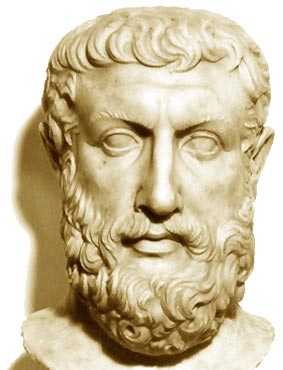“It is indifferent to me where I am to begin, for there shall I return again.”
Frag. B 5, quoted by Proclus, Commentary on the Parmenides, 708
Parmenides of Elea was a pre-Socratic Greek philosopher from Elea in Magna Graecia . He was the founder of the Eleatic school of philosophy.
The single known work by Parmenides is a poem, On Nature, only fragments of which survive. In it, Parmenides prescribes two views of reality. In "the way of truth" , he explains how reality is one, change is impossible, and existence is timeless, uniform, necessary, and unchanging. This is generally considered one of the first digressions into the philosophical concept of being, and has been contrasted with Heraclitus's statement that "No man ever steps into the same river twice" as one of the first digressions into the philosophical concept of becoming.
Parmenides and Heraclitus are therefore generally considered two of the founders of ontology. Scholars have generally believed that either Parmenides was responding to Heraclitus, or Heraclitus to Parmenides, though opinion on who was responding to whom changed over the course of the 20th century. In "the way of opinion", Parmenides explains the world of appearances, in which one's sensory faculties lead to conceptions which are false and deceitful. He has been considered the founder of metaphysics or ontology.

“It is indifferent to me where I am to begin, for there shall I return again.”
Frag. B 5, quoted by Proclus, Commentary on the Parmenides, 708
Frag. B 2.2-6, quoted by Proclus, Commentary on the Timaeus I, 345
Frag B 1.28-30, quoted by Sextus Empiricus, Against the Mathematicians, vii. 3; Simplicius, Commentary on the Heavens, 557-8; Proclus, Commentary on the Timaeus I, 345
Frag. B 8.1-4, quoted by Simplicius, Commentary on the Physics, 144
Frag. B 7.1-2, quoted by Plato, Sophist, 237a
Frag. B 7.3-8.1, quoted by Sextus Empiricus, Against the Mathematicians, vii. 3
“For it is the same thing that can be thought and that can be.”
Frag. B 3, quoted by Plotinus, Enneads V, i.8